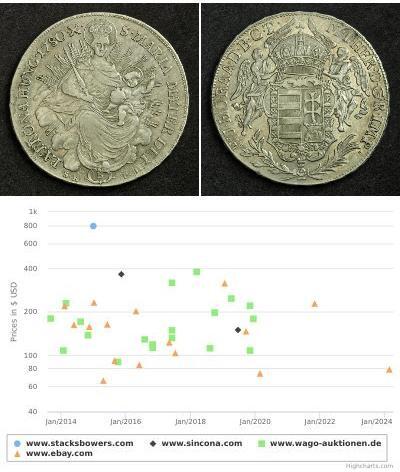1 Daalder (sold for $72.0)
164?, Netherlands, Utrecht. Large Silver Dog Dollar (Lion Daalder) Coin.
Mint Year: 164?
Province: Utrecht
State: Netherlands (United Provinces)
Condition: A typical crudely struck VF+
Reference: Davenport 4863, Delmonte 844, KM-32.
Denomination: Lion Dollar / Dog Dollar (Leeuwendaalder in Dutch)
Weight: 26.84gm
Diameter: 42mm
Material: Silver
Obverse: Standing knight left, head right, in front of his legs arms shield bearing a standing lion (without crown).
In Dutch: Ridder rechtsom kijkend met voor zich wapen met klimmende leeuw.
Legend: (shield) MO ARG PRO CON FOEBELG TRA
Reverse: Heraldic lion left with long ornate S-like tail. / In Dutch: Klimmende leeuw l.
Legend: ONFIDENS · DNO · NON· MOVETVR · I64?
Translated: "Relying on God I shall not be Confounded!"
Dutch New Netherlands Colony (New York). The lion dollar also circulated throughout the English colonies during the Seventeenth and early Eighteenth centuries. Examples circulating in the colonies were usually fairly well worn so that the design was not fully distinguishable, thus they were sometimes referred to as "dog dollars."
em>.
The Republic of the Seven United Netherlands (or "of the Seven United Provinces") (Republiek der Zeven Verenigde Nederlanden/Provinciën; also Dutch Republic or United Provinces in short, Foederatae Belgii Provinciae or Belgica Foederata in Latin) was a European republic between 1581 and 1795, in about the same location as the modern Kingdom of the Netherlands, which is the successor state.
Before 1581, the area of the Low Countries consisted of a number of duchies, counties, and independent bishoprics, some but not all of them part of the Holy Roman Empire. Today that area is divided between the Netherlands, Belgium, Luxembourg and parts of France and Germany. The Low Countries in the 16th century roughly corresponded to the Seventeen Provinces covered by the Pragmatic Sanction of 1549 of Holy Roman Emperor Charles V.
Through marriage, war or sale, these states were acquired by the Habsburg emperor Charles V and his son, king Philip II of Spain. In 1568, the Netherlands, led by William I of Orange, revolted against Philip II because of high taxes, persecution of Protestants by the government, and Philip's efforts to modernize and centralize the devolved medieval government structures of the provinces. This was the start of the Eighty Years' War.
In 1579, a number of the northern provinces of the Netherlands signed the Union of Utrecht, in which they promised to support each other in their defence against the Spanish army. This was followed in 1581 by the Act of Abjuration, the declaration of independence in which the provinces officially deposed Philip II.
The United Provinces first tried to choose their own lord, and they asked the Duke of Anjou (sovereign from 1581-1583) to rule them. Later, after the assassination of William of Orange (July 10, 1584), both Henry III of France and Elizabeth I of England declined the offer of sovereignty. However, the latter agreed to turn the United Provinces into a protectorate of England (Treaty of Nonsuch, 1585), and sent the Earl of Leicester as governor-general. This was not a success, and in 1588 the provinces became a Republic.
Only 1$ shipping for each additional item purchased!

|
Posted by:
anonymous 2014-06-17 |
|
||
|
||
|
||

_Kingdom_of_Holland_(1806_1810)-600-300-AFgKbzbiDJUAAAFGRr4Olauv.jpg)

_Kingdom_of_Holland_(1806_1810)-300-150-_OcKX9ISg0QAAAFZyl5Fye3V.jpg)
 Deutsch
Deutsch Русский
Русский Українська
Українська English
English Italiano
Italiano Français
Français Español
Español 汉语
汉语












